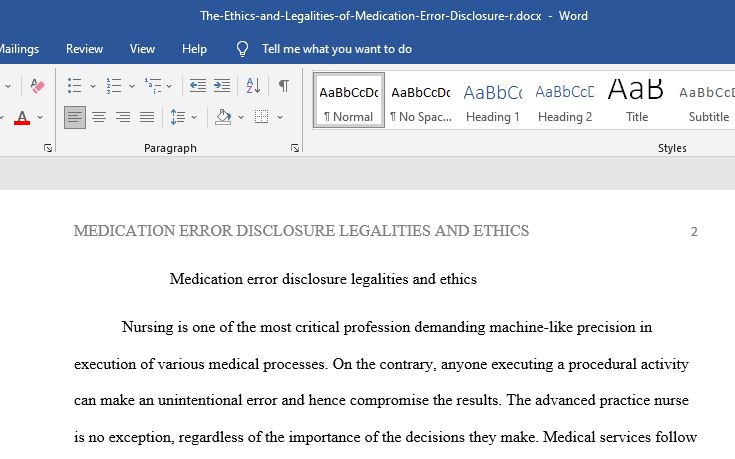Medication Error Disclosure legalities and ethics
American writer Nikki Giovanni once said: “Mistakes are a fact of life. It is the response to the error that counts” (Goodreads, 2012). Whenever you make an error when writing a prescription, you must consider the ethical and legal implications of your error—no matter how seemingly insignificant it might be. You may fear the possible consequences and feel pressured not to disclose the error. Regardless, you need to consider the potential implications of non-disclosure. How you respond to the prescription error will affect you, the patient, and the health care facility where you practice. In this Assignment, you examine ethical and legal implications of disclosure and nondisclosure of personal error.
Consider the following scenario:
- You are working as an advanced practice nurse at a community health clinic. You make an error when prescribing a drug to a patient. You do not think the patient would know that you made the error, and it certainly was not intentional.
To prepare:
- Consider the ethical implications of disclosure and nondisclosure.
- Research federal and state laws for advanced practice nurses. Reflect on the legal implications of disclosure and nondisclosure for you and the health clinic.
- Consider what you would do as the advanced practice nurse in this scenario including whether or not you would disclose your error.
- Review the Institute for Safe Medication Practices website in the Learning Resources. Consider the process of writing prescriptions. Think about strategies to avoid medication errors.
Write a 3- page paper that addresses the following:
- Explain the ethical and legal implications of disclosure and nondisclosure. Be sure to reference laws specific to your state.
- Describe what you would do as the advanced practice nurse in this scenario including whether or not you would disclose your error. Provide your rationale.
- Explain the process of writing prescriptions including strategies to minimize medication errors.
Find below the required readings for the assignment. Other outside sources can be used as well but nothing before the year 2010.
REQUIRED READINGS
Arcangelo, V. P., Peterson, A. M., Wilbur, V., & Reinhold, J. A. (Eds.). (2017). Pharmacotherapeutics for advanced practice: A practical approach (4th ed.). Ambler, PA: Lippincott Williams & Wilkins.
- Chapter 1, “Issues for the Practitioner in Drug Therapy” (pp. 3–14)
This chapter introduces issues relating to drug therapy such as adverse drug events and medication adherence. It also explores drug safety, the practitioner’s role and responsibilities in prescribing, and prescription writing.- Chapter 59, “The Economics of Pharmacotherapeutics” (pp. 1009-1018)
This chapter analyzes the costs of drug therapy to health care systems and society and explores practice guideline compliance and current issues in medical care.- Chapter 60, “Integrative Approaches to Pharmacotherapy—A Look at Complex Cases” (pp. 1021-1036)
This chapter examines issues in individual patient cases. It explores concepts relating to evaluation, drug selection, patient education, and alternative treatment options.
Due to the importance of ethical and legal considerations in advanced practice nursing, several resources have been provided for your reference.
Sabatino, J.A., Pruchnicki, M.C., Sevin, A.M., Barker, E., & Green, C.G. (2017). Improving prescribing practices: A pharmacist‐led educational intervention for nurse practitioner students.
The authors of this article assess the impact of a pharmacist‐led educational intervention on family nurse practitioner (FNP) students’ prescribing skills, perception of preparedness to prescribe, and perception of pharmacist as collaborator.
Note: Retrieved from the Walden Library databases.
American Nurses Association. (2001). Code of ethics for nurses with interpretive statements. Nursing World. Retrieved from http://www.nursingworld.org/MainMenuCategories/Eth…
This article outlines ethical standards in the nursing profession and identifies nine provisions of care that must be adhered to by all nurses.
Ladd, E., and Hoyt, A. (2016).Shedding Light on Nurse Practitioner Prescribing. The Journal For Nurse Practitioners. 12(3). 166-173.
This article provides NP’s with information regarding state based laws for NP prescribing.
Note: Retrieved from the Walden Library databases.
Drug Enforcement Administration. (n.d.). Mid-level practitioners authorization by state. Retrieved from August 23, 2012, http://www.deadiversion.usdoj.gov/drugreg/praction…
This website outlines the schedules for controlled substances, including prescriptive authority for each schedule.
Answer preview:

Word: 1,100
